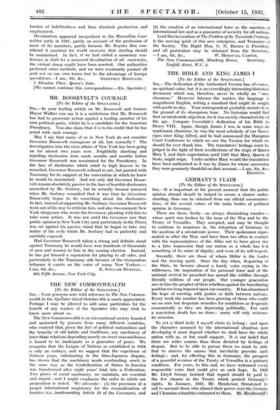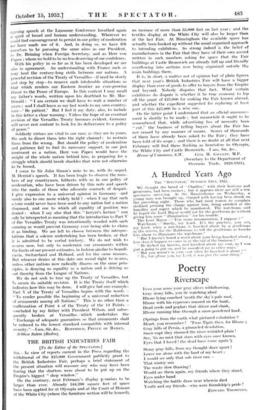GERMANY'S CLAIM
[To the Editor of the SPECTATOR.] SIR,—It is important at the present moment that the public opinion abroad should be helped to secure a clearer under- standing, than can be obtained from our official communica- tions, of the several values of the main bodies of political opinion in Germany.
There are those, firstly—an always diminishing number—. whose spirit was broken by the issue of the War and by the Treaty of Versailles. They accepted, and may be thought to continue to acquiesce in, the relegation of Germany to the position of a second-rate power. Their spokesmen repre- sented us after the War, and have been too often in contact with the representatives of the Allies not to have given rise to a false impression that our nation as a whole has lest something of its sense of dignity, and even of its self-respect.
Secondly, there are those of whom Hitler is the leader and the moving spirit. Since the day when, despairing of the State, he became • almost a lonely voice crying in the wilderness, the inspiration of his personal force and of the national revival he preached has spread like wildfire through literally millions of our people. Our younger generation sees in him the prophet of their rebellion against the humiliating position too long imposed upon our country. It has abandoned the hope of meeting with justice or faith between nations. Every week the number has been growing of those who could see no cure but desperate remedies for conditions as desperate economically as they are depressing politically. For such a conviction death has no fears : many will Only welcome its occasion. .
To yet a 'third body I myself claim to belong ; and upon
the character assumed by the international situation now developing it must depend whether we shall have the wbole nation with us, or but small support. It is our belief that there are wider courses than those dictated by- feelings of despair. But to be able to pursue them we must be able first to remove the causes that inevitably provoke such feelings ; and, for effecting this in Germany, the prospect of a peaceful revision of the Treaty of Versailles is a primary condition. For years, to this end, we have welcomed every responsible voice that could give us such hope. In 1921 Mr. Lloyd George insisted that regard should. be paid ic the few clauses in the Treaty which protect, Germany's rights. In January, 1931, Mr. Henderson, threatened ,tc call to account those who. abused their power Oyer the Gernian and Ukranian minorities entrusted to them. Bir. cDonald's opening speech at the Lausanne Conference breathed again a spirit of broad and human understanding. Wherever we
could find encouragement to persist in our policy of moderation we have made . use of it. And, in doing so, we have felt ourselves to be pursuing the same aims as our President, as Dr. Bruning when Foreign Secretary, and as Herr von Papen ; whom we hold to be no less deserving of our confidence.
With his policy in so far as it has been developed we are also in agreement. An understanding with France such as may heal the century-long strife between our nations. A peaceful revision of the Treaty of Versailles—if need be slowly and step by step—to remove such intolerable situations as that which renders our Eastern frontier an ever-growing threat to the Peace of Europe. In this context I may recall my father's words, written upon his deathbed to Mr. Mac- Donald : I am certain we shall have to wait a number of years ; and I shall leave as my last words to my own country- men= Be patient.' But I feel it my duty, also, to include in this letter a clear warning : Unless the hope of an eventual revision of the Versailles Treaty becomes evident, Germany will never rest content to look for its deliverance to a policy of peace."
Soldierly virtues are vital to our race, as they are to yours. We seek to direct them into the right channel : to restrain them from the wrong. But should the policy of moderation and patience fail to find its necessary support, in our just treatment as a nation, Herr von Papen would have the weight of the whole nation behind him, in preparing for a struggle which should break shackles that were not otherwise to .be loosed.
I come to Sir John Simon's note to us, with its sequel, M. Herriot's speech. It has been tragic to observe the num- bers of my countrymen, hitherto with us in our policy of moderation, who have been driven by this note and speech into the ranks of those who advocate counsels of despair. I give expression to a universal opinion in Germany—and surely also to one more widely held ?—when I say that such a tone could never have been used to any nation but a nation disarmed, and one to which all equality of position was denied : when I say also that this " lawyer's lecture " can only be interpreted as meaning that the introduction to Part V of the Versailles Treaty was intentionally worded with such cunning as would prevent Germany ever being able to claim it as binding. We are left to choose between the interpre- tations that a solemn undertaking has been broken, or that it is admitted to be verbal trickery. We do not wish to re-arm now, but only to modernize our armaments within the limits of our present estimates, in fashion similar to Scandi- navia, Switzerland and Holland, and for the same reasons. But whoever 'denies at this date our moral right to re-arm, unless other nations now radically disarm on the same prin ciples, is denying us .equality as a nation and is driving us out thereby from the League of Nations.
We do not seek to tear up the Treaty of Versailles, but to secure its suitable revision. It is the Treaty itself which indicates, how this may be done. I will give but one example. Part V of the Treaty of Versailles begins with the words " To render possible the beginning of a universal reduction of armaments among all Nations." This is no other than a reaffirmation of Point 4 of the Treaty of the 14 Points — concluded by my father with President Wilson, and subse- quently broken at Versailles—which undertakes the " Exchange of adequate guarantees so that armaments shall be reduced to the lowest standard compatible with internal security."-I am, Sir, Sze., BERTHOLD, PRINCE OF BADEN. ,
Schloss Salem (Baden).



























































 Previous page
Previous page